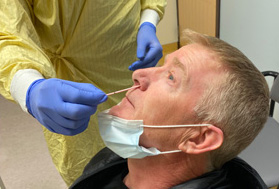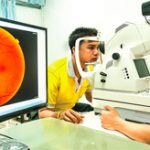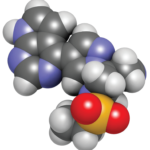 Note: This article was updated July 21 to add recommendations on restarting biologics following COVID-19.
Note: This article was updated July 21 to add recommendations on restarting biologics following COVID-19.
On April 29, the ACR released Guidance for the Management of Adult Patients with Rheumatic Disease During the COVID‐19 Pandemic and later updated the guidance for publication in Arthritis & Rheumatology. The recommendations address various treatment options and provide general guidance, as well as direction for when to start, stop or reduce medications. All recommendations are based on current knowledge and will be revised as circumstances and evidence evolve.
Methods
The ACR COVID-19 Clinical Guidance Task Force, including 10 rheumatologists and four infectious disease specialists, convened on March 26. Clinical questions were collated, and an evidence report was generated and disseminated to the panel. Questions and draft statements were reviewed and assessed using a well-established method of consensus building (i.e., modified Delphi process). This included two rounds of asynchronous anonymous voting by email and two webinars including the entire panel. Panel members voted on agreement with draft statements using a numeric scoring system, and consensus was determined to be low (L), moderate (M) or high (H), based on the dispersion in voting results. To be approved as guidance, median votes were required to correlate to predefined levels of agreement (with median values interpreted as agreement, uncertainty or disagreement) with either moderate or high levels of consensus.
The Recommendations
General statements for patients with rheumatic disease:
- The risk of poor outcomes from COVID-19 appears to be related primarily to general risk factors, such as age and comorbidity (H).
- Patients should be counseled on general preventive measures (e.g., social distancing and hand hygiene) (H).
- As part of a shared decision-making process between patients and rheumatology providers, select measures to reduce healthcare encounters and potential exposure to SARS-CoV-2 (beyond general preventive measures) may be reasonable (e.g., reduced frequency of lab monitoring, optimal use of telehealth, increased dosing intervals between intravenous medications) (M/H).
- If indicated, glucocorticoids should be used at the lowest dose possible to control rheumatic disease, regardless of exposure or infection status (M/H).
Glucocorticoids should not be abruptly stopped, regardless of exposure or infection status (H). - If indicated, angiotensin-converting enzyme (ACE) inhibitors or angiotensin receptor blockers (ARBs) should be continued in full doses or initiated (M/H).
For ongoing treatment of stable patients in the absence of infection or SARS-CoV-2 exposure:
- Hydroxychloroquine or chloroquine, sulfasalazine, methotrexate, leflunomide, immunosuppressants (e.g., tacrolimus, cyclosporine, mycophenolate mofetil, azathioprine), biologics, Janus kinase (JAK) inhibitors and non-steroidal anti-inflammatory drugs (NSAIDs) may be continued (this recommendation includes patients with giant cell arteritis who have been prescribed interleukin [IL] 6 inhibitors) (M/H).
- Denosumab may still be given, extending dosing intervals to no longer than every eight months, if necessary to minimize healthcare encounters (M).
- For patients with a history of vital organ-threatening rheumatic disease, immunosuppressants should not be dose reduced (M).
In patients with systemic lupus erythematosus (SLE):
- In newly diagnosed disease, hydroxychloroquine or chloroquine should be started at full dose, when available (H).
- In pregnant women with SLE, hydroxychloroquine or chloroquine should be continued at the same dose, when available (H).
- If indicated, belimumab may be initiated (M).
For patients with newly diagnosed or active rheumatic diseases in the absence of infection or SARS-CoV-2 exposure:
Active Inflammatory Arthritis:
- For patients well controlled on hydroxychloroquine or chloroquine, this disease-modifying anti-rheumatic drug (DMARD) should be continued, when available; when unable to access (including in patients with active or newly diagnosed disease), switching to a different conventional synthetic DMARD (csDMARD) (either as monotherapy or as part of combination therapy) should be considered (M/H).
- For patients well controlled on an IL-6 inhibitor, this DMARD should be continued, when available; when unable to access the agent, switching to a different biologic should be considered (M). The panel noted uncertainty regarding the use of JAK inhibitors in this situation.
- For patients with moderate to high disease activity despite optimal csDMARDs, biologics may be started (H). The panel noted uncertainty regarding the use of JAK inhibitors in this situation.
- For active or newly diagnosed inflammatory arthritis, csDMARDs may be started or switched (M).
- If indicated, low-dose glucocorticoids (≤10 mg prednisone equivalent) or NSAIDs may be started (M/H).
Other Rheumatic Diseases:
- In patients with systemic inflammatory or vital organ-threatening disease (e.g., lupus nephritis or vasculitis), high-dose glucocorticoids or immunosuppressants may be initiated (M).
- In patients with newly diagnosed Sjögren’s syndrome, given the paucity of data proving efficacy, hydroxychloroquine or chloroquine should not be started (M).
For ongoing treatment of stable patients following SARS-CoV-2 exposure (without symptoms related to COVID-19):
- Hydroxychloroquine, sulfasalazine and NSAIDs may be continued (M/H).
- Other immunosuppressants, non-IL-6 biologics and JAK inhibitors should be stopped temporarily, pending a negative test result for COVID-19 or after two weeks of symptom-free observation (M). The panel noted uncertainty regarding temporarily stopping methotrexate or leflunomide in this situation.
- In select circumstances, as part of a shared decision-making process, IL-6 inhibitors may be continued (M).
For rheumatic disease treatment in the context of documented or presumptive COVID-19 infection:
- Regardless of COVID-19 severity, antimalarial therapies (hydroxychloroquine or chloroquine) may be continued, but sulfasalazine, methotrexate, leflunomide, immunosuppressants, non-IL-6 biologics and JAK inhibitors should be stopped or held (M/H).
- For patients with severe respiratory symptoms, NSAIDs should be stopped (M). The panel demonstrated low consensus with regard to stopping NSAIDs in the absence of severe symptoms.
- In select circumstances, as part of a shared decision-making process, IL-6 inhibitors may be continued (M).
Reinitiating treatment following COVID-19:
- For patients with uncomplicated COVID-19 infections (characterized by mild or no pneumonia and treated in the ambulatory setting or via self-quarantine), consideration may be given to restarting rheumatic disease treatments (e.g., DMARDs, immunosuppressants, biologics and JAK inhibitors) within seven to 14 days of symptom resolution. For patients who have a positive PCR test for SARS-CoV-2, but are (and remain) asymptomatic, consideration may be given to restarting rheumatic disease treatments (e.g., DMARDs, immunosuppressants, biologics and JAK inhibitors) 10 to 17 days after the PCR test is reported as positive (H).
- Decisions regarding the timing of reinitiating rheumatic disease therapies in patients recovering from more severe COVID-19-related illness should be made on a case-by-case basis (H).
Bottom Line
These statements are not intended to replace clinical judgment. Modifications made to treatment plans, particularly in complex rheumatic disease patients, are highly disease, patient, geography and time specific, and, therefore, must be individualized as part of a shared decision-making process. This guidance is provided as part of a living document, recognizing rapidly evolving evidence and the anticipated need for frequent updates as such evidence becomes available.
The Task Force
- Ted R. Mikuls, MD, MSPH (Chair), University of Nebraska Medical Center
- Reuben J. Arasaratnam, MD, MPH, UT Southwestern Medical Center
- Lindsey R. Baden, MD, Brigham and Women’s Hospital
- Bonnie L. Bermas, MD, UT Southwestern Medical Center
- Winn Chatham, MD, University of Alabama-Birmingham
- Stanley Cohen, MD, Rheumatology Associates Dallas
- Karen Costenbader, MD, MPH, Brigham and Women’s Hospital
- Liana Fraenkel, MD, MPH, Yale University
- Ellen M. Gravallese, MD, Brigham and Women’s Hospital
- Sindhu Johnson, MD, PhD, Toronto Western Hospital
- Andre C. Kalil, MD, MPH, University of Nebraska Medical Center
- Kenneth G. Saag, MD, MSc, University of Alabama-Birmingham
- Michael E. Weinblatt, MD, Brigham and Women’s Hospital
- Kevin Winthrop, MD, MPH, Oregon Health & Science University
Originally posted May 2, 2020; Updated July 21, 2020



